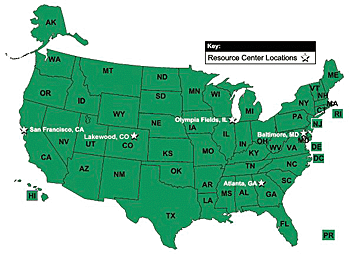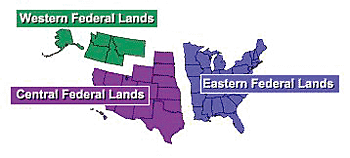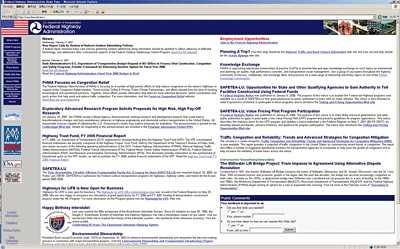Overseas News on Civil Engineering IT
|
|
This section focuses on a unique overseas website related to civil engineering IT. This issue features the Federal Highway Administration (FHWA), a major agency of the U.S. Department of Transportation.
|
||||||||
FHWA Spreads Out Its Services Throughout the Nation with Its Organizational Basis The FHWA is headquartered in Washington, DC, having three types of field offices in every State of the U.S., the District of Columbia, and Puerto Rico. First, Resource Centers are located in five cities of Atlanta, Ga., Baltimore, Md., Lakewood, Co., Olympia Fields, Il., and San Francisco, Ca. As their mission, they advance transportation technologies and solutions through providing training and technical assistance to FHWA's Division Offices, State Departments of Transportation, Metropolitan Planning Organizations, and other transportation partners. They also play a part in achieving the strategic goals of the FHWA mentioned above, as well as in delivering the Federal-aid Program. Second, Federal-aid Division Offices provide front line Federal-aid program delivery support to the parties involved. Fifty-two operating division offices are located in the same city as the State department of transportation in each State, the District of Columbia, and Puerto Rico. Additionally, the FHWA has established four metropolitan offices in the cities of Philadelphia, New York, Chicago, and Los Angeles. Third, Federal Lands Highway (FLH) Division Offices administer FLH programs, the Defense Access Roads Program, and the Emergency Relief Program on Federally Owed Roads. Besides, they provide engineering related services to other Federal agencies, FHWA offices, and foreign countries as directed, carrying out technology and training activities relevant to FLH projects. There are three FLH divisions (Eastern, Central, and Western) with offices located in Sterling, Va.; Lakewood, Co.; and Vancouver, Wash., respectively. |
  FHWA Field Offices(Resource Centers and Division Offices) FHWA Field Offices(Resource Centers and Division Offices)  FHWA Field Offices Federal Lands Highway Division Offices FHWA Field Offices Federal Lands Highway Division Offices |
|||||||
A Vast Amount of Information on Highways is Classified in a Practical Way The website of the FHWA is so designed for users as to easily gain necessary information on the FHWA on a business basis. For example, on the page of "FHWA Programs," many different plans and programs are classified by categories. In addition, on the page of "Legislation and Regulations," users can readily read a variety of information on legislation and regulations. Meanwhile on "FHWA By Day" pages, the historical events of FHWA are compiled and classified by day. There are some other unique attempts as well, like "Highway History" pages, which display diverse pieces of information on highways, one of which is a list of "some road songs," a large number of songs and hit tunes related with roads and highways, for example. |
||||||||
This article is written based on the above web site with the permission of FHWA.



